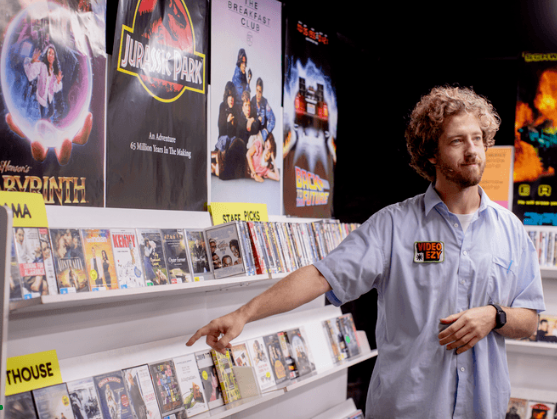
Coil co-creator and performer Steve Wilson-Alexander Image credit: Rosie Hastie
By Flynn Boffo
Coil is a heartfelt tribute to video stores and communities that surrounded them. Described as a live cinema experience the show was written by Mark Rogers and performed by Solomon Thomas, Steve Wilson-Alexander & Carly Young who together take us on a trip back through the video store and in the process film and edit an entire short film live on stage.
This beautiful act of rearranging moments live for an audience lends itself excellently to the nostalgic backdrop of the video store, a place most of us left years ago never to return. It is this location or more specifically the attempt to reanimate it that is central to Coil.
I first came across Coil and the work of re:group performance collective last year with their limited season at the Sydney Opera House, this year Coil returned for a two month regional tour which has just wrapped up, fortunately for Sydneysiders there are two final shows at the Bondi Pavilion this week on the 7th & 8th.
I got to chat with performer and co-creator Steve Wilson-Alexander last week, here’s our conversation.
Flynn Boffo: So you’ve been on the road for a bit now.
Steve Wilson-Alexander: Yes, the traveling part of the tour is done. So I’m back in Wollongong, sleeping in my own bed. We were on the road for about two months. Which was pretty massive, it was a regional tour. We did Coffs Harbour, Albury, Wodonga, we went down to Launceston and Burnie and then did Wollongong and Portland in Victoria, Wangaratta, Queanbeyan. We did Logan and Redlands and then we went up to the Darwin festival. It’s a pretty big deal for us. We’ve definitely never done anything like this before.
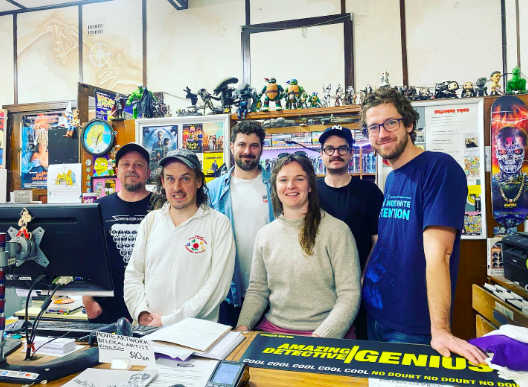
Re:group with the team at Bellingen Video
Image credit @bellingen_video
I saw the post you did with Bellingen video. It was so cool to see that along with this tour. You’re also doing a tour of the remaining video stores.
Yeah, and we only came across three. I think in all of those places that we went to there was Belingen near Coffs, there was still a leading edge video in Birkdale near the Redland Art Center where we performed, that was pretty wild. Actually there were a lot of video shops, a few in Bega as well but they’d be part of the newsagent or corner store and they were all selling their stock. So I guess it’s on the way out.
Our video designer Sol (Solomon Thomas) was speculating that maybe the lack of internet coverage, combined with the higher density of caravan parks, meant that people would get there. See there’s no internet but there’s a DVD player in their accommodation.
It’s really cool to see that you guys are celebrating something that hasn’t been celebrated in a very long time. I was curious to hear about the interactions you might have had with people who either worked at video stores or had memories, like what’s that community engagement been like on the show?
Oh, it’s huge. Yeah, there are a lot of people that come up and say, I used to work in a video shop. It was the best job ever. Which makes me a bit jealous because I remember handing out my resume to my local video shop. But I was not reading the room because they were a family-run business. So they weren’t exactly hiring anyone. But particularly in regional towns, the community shop is like the lifeline to the outside world, that international world of movies and Hollywood. It was very important because all cultural spaces are more important in a regional area because there’s fewer of them and those connections need to be stronger. It felt particularly relevant to be telling this story in regional Australia.
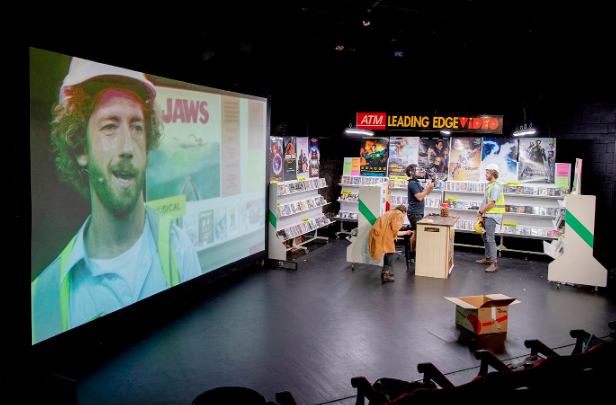
Image credit: Rosie Hastie
How did you come together as regroup? Was this always going to be a live cinema performance collective or were you more theatre-focused?
SWA: I think we always view ourselves as mostly theatre, ‘Live Cinema’ was a term that we came up with after the fact. After we had made the show ‘Lovely’ in 2014 and ‘Route Dash Niner: Part Two in 2017. It was only then that we were sort of like, oh, we need a way to explain what we do quickly in applications and in a way that sort of makes sense immediately instead of having to explain it all. But in reality, that’s what we’re interested in its a theatrical tool. We don’t really consider ourselves filmmakers. When we make this sort of work, it’s usually just a nod towards filmmaking. We have references and different types of shots and techniques. And Solomon’s camera rig is definitely growing and becoming more and more impressive and complex. As it goes on.
We’re interested in what happens between the stage and the screen. The screen often elicits choreography from us, we have to be dedicated to that and create something that looks a certain way and it demands a certain discipline and rigor. We think the interesting thing is watching us be compelled to do that. That sort of choreography in our shows can be quite complex, but because lots of people are film-literate these days, pretty much everyone knows how to watch a movie and watch the screen. It’s actually quite an accessible art form as well, like people can inherently understand what the attempt is to do.
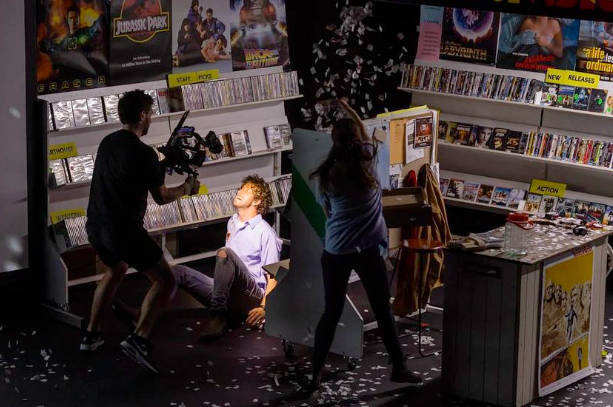
Image credit: Rosie Hastie
Audiences now are more film literate and I can see how that applies to your practice now using a screen in your theatre. Watching it, I became much more aware of not only the blocking of the actors, but the blocking of the camera. Getting to see that side of the performance and a film being made in front of me was really exciting. How do you feel this affects the connection with the audience?
All of those are techniques that we have up our sleeves to tell the story, so the filmmaking is part of it, the choreography of the camera operator and the performer, when are they working in sync? When are they working against each other? And I think this is part of why we’re not making a movie, even though it might feel like it for the audience.
That’s maybe one of the conceits of the work is I can walk out and say hey, we’re going to make a movie now. But really the meaning is in the whole theatre show from start to finish. When the cameras are on, when the cameras are off, when we’ve made a mistake, when we haven’t made a mistake, you know, when the movie is getting played back to you when, when we’re just figuring it out. All of those different things play a part, and it helps that Sol was trained as a dancer. So we’re and we’re often just thinking about choreography and moving in sync with each other and what’s gonna be meaningful or easy or difficult to follow at different points for the audience.
It’s really cool to see in the show, how much you acknowledge that this is a team effort. There’s a lot of talk about this auteur theory, the idea of there being a single author to great works. But it was really refreshing to see how you’re very open about the team process in the sense that you can even see the entire team on the stage.
The idea that we do anything alone is stupid to me, I think the reason we are interested in theatre is because you have to make it with other people and then you have to get other people into the room, and then you all show it to each other and you share in that moment. And when we talk about the video shop closing down in this show, we’re really lamenting that there was a space that went to, usually with your family or your friends and you talked to the community.
Our show talks about nostalgia and it, sort of gets to eat its cake and have it too because people love nostalgia and we get to use that to our advantage. We can give you nostalgia, that feeling of this video shop there’s killer pythons and DVD spines and posters, it’s great to remember this. But we also are able to say, well nostalgia kind of sucks because you don’t know that what you’re missing are relationships. It was always the most important thing. Its people.
The idea of the auteur, we would love to break that down, in our show you couldn’t remove any of us, Mark or Carly, Sol or Malcolm. If you removed any of us from the process it would be a completely different show. We’ve all written and formed it together, that’s really important to us. We want people to feel like they’re sort of a part of the work and that they’re welcome to it, we’re better than them, there isn’t something happening on stage that’s secret. We’re just going to show you how we’re doing it.
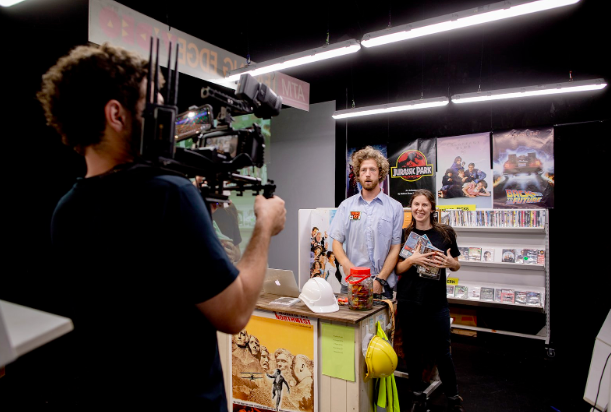
Left – Performer/Video designer: Solomon Thomas, Middle – Performer: Steve Wilson-Alexander, Right – Performer/Set designer: Carly Young
Image credit: Rosie Hastie
It’s a beautiful act of time travel. What you guys have created with that video store on the stage and getting to walk through the video store, I was brought to tears and it was quite a beautiful experience. Getting to see this work that your team puts together on stage really opened my mind.
That’s really awesome to hear. I’ve been listening to this podcast called Guys, which it’s a really dumb podcast. It’s not necessarily a recommendation, but they just talk about different types of guys that exist like heavy metal guys, or CrossFit guys or whatever, but I was listening to it as we were doing the tour. And in the show, my character is sort of like this kind of sad guy who still works in a video shop and the video shops are closing down, and he still thinks he’s living that dream like “I want to be a director like Martin Scorsese. Or, I want to be an actor like Robert De Niro”. Every 17 year old boy, just gets 100 different men that they are told that they should be like, you know? And it’s sort of a pathetic stock that you get and you’re like, Oh, cool. Well, I want to be Quentin Tarantino and I want to make a movie like Reservoir Dogs.
I think none of that’s bad. But it’s not good to just be one type of guy, like this podcast. Everyone’s a little bit of something, we all might be into hot sauce or we all might be into whiskey. But you just can’t just make it your entire life and I think as an artist, that’s also important and I think something that’s at play in regroup is like, don’t be just one thing. You can write and that will help you if you want to operate the camera and that will help you if you want to perform, all of these things feed into each other.
Coil will have two performances at the Bondi Pavilion on the 7th & 8th of September.
Tickets are available here.
